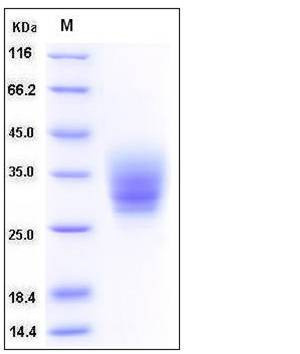Mouse CD147 / EMMPRIN / Basigin Protein (His Tag)
AI115436,AI325119,CD147,EMMPRIN,HT-7
- 100ug (NPP3210) Please inquiry
| Catalog Number | P50332-M08H |
|---|---|
| Organism Species | Mouse |
| Host | Human Cells |
| Synonyms | AI115436,AI325119,CD147,EMMPRIN,HT-7 |
| Molecular Weight | The secreted recombinant mouse BSG comprises 199 amino acids and has a predicted molecular mass of 30 kDa. As a result of glycosylation, the apparent molecular mass of rm BSG is approximately 30-35 kDa in SDS-PAGE under reducing conditions. |
| predicted N | Ala 22 |
| SDS-PAGE |  |
| Purity | > 90 % as determined by SDS-PAGE |
| Protein Construction | A DNA sequence encoding the extracellular domain of mouse BSG isoform 2 (NP_001070652.1) (Met 1-Arg 209) was expressed, fused with a polyhistidine tag at the C-terminus. |
| Bio-activity | |
| Research Area | Immunology |Signal Transduction |Metabolism |Types of disease |Metabolism in Cancer |
| Formulation | Lyophilized from sterile PBS, pH 7.4 1. Normally 5 % - 8 % trehalose and mannitol are added as protectants before lyophilization. Specific concentrations are included in the hardcopy of COA. |
| Background | CD147/EMMPRIN (Extracellular Matrix Metalloproteinase Inducer), also known as Basigin (BSG), is a transmembrane glycoprotein with different forms resulted from different modes of glycosylation and N-terminal sequence variants. It is a member of the immunoglobulin superfamily with homology to both the immunoglobulin V domain and MHC class II antigen beta-chain. This protein play important roles in variety of events including spermatogenesis, embryo implantation, neural network formation. CD147 induces the production and release of matrix metalloproteinases (MMP) in the surrounding mesenchymal cells and tumor cells, and thereby promotes invasion, metastasis, growth and survival of malignant cells. Furthermore, CD147 also serves as a receptor for extracellular cyclophilinthe and its association with integrins might be important in signal transduction. Recently, CD147 displays increased expression in many cancers, and it has been previously demonstrated to participate in cancer metastasis and progression. Thus, CD147 and its antibody are used as an effective treatment for malignant cancers. |
| Reference |
